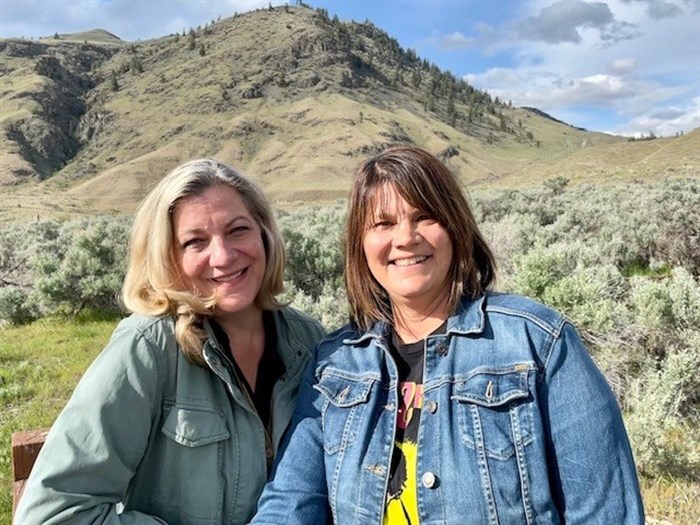
Kim English, the regional community development co-ordinator of the Community Foundation of the South Okanagan Similkameen, and Kelly Terbasket, the director and co-founder of IndigenEYEZ.
Image Credit: Photo by Madeline Terbasket
June 01, 2022 - 10:51 AM
A two-year pilot program will bring Indigenous and non-Indigenous community members together at the kitchen table to discuss truth and reconciliation. The first gatherings are planned in syilx Territory this fall.
Table Talks is a collaborative effort between the Community Foundation of the South Okanagan Similkameen (CFSOS) and IndigenEYEZ. During a Table Talk session, trained Indigenous and non-Indigenous facilitators will safely guide difficult conversations that delve into the truth about colonization and the historical and ongoing injustices committed by Canada against Indigenous peoples. At the same time, these discussions are designed to promote relationship-building and to breathe life into sqilx’w beliefs and teachings, specifically syilx principles in this case.
“Learning is relational and experiential. You can’t really change by sitting at a desk and getting a bunch of information alone,” said Kelly Terbasket, the director and co-founder of IndigenEYEZ, who is of syilx and European heritage.
“That helps to reframe and rethink. But to really create change, we need to do it. We need to be in the motion of it. And that’s what we do. We train people how to do that.”
The program follows a similar format to IndigenEYEZ’s kinSHIFT initiative, which launched in 2020. It is an Indigenous-led program that consists of Indigenous facilitators hosting related workshops at settler organizations and schools.
“How do we bring that to not only organizations and schools, but [also] to the neighbourhood kitchen table?” asked Terbasket. “You can’t have hard conversations if you don’t have connection.”
“We train people how to build that container of safety and to be able to hold harder conversations in a way that isn’t further dividing and furthering other-ing. In a way that brings us together instead of further apart.”
The foundation of the Table Talks, she continued, is captíkwl (syilx oral storytelling law), with the biggest teachers being sn?k?lip and x??a?ylx? (coyote and fox). As for the name of the program itself, she said that it was inspired by her grandma, Betty Terbasket.
The name “came from recognizing that my grandma’s kitchen table was where a lot of things happened,” she said. “A lot of conversation, connection over food. And that this is where we gathered to learn and be kin, was around the kitchen table.”
The idea for Table Talks gained momentum last year through discussions between Terbasket and Kim English, a fourth-generation settler who is the regional community development coordinator of CFSOS.
“I wanted to help cultivate, stimulate conversation between people of what localized colonization looks like. Non-Indigenous people – there’s a lot of talk of truth and reconciliation, and what is that truth, before reconciliation?” English said. “But as a settler myself, and in conversations with non-Indigenous people, many people don’t know how to start those conversations.”
The plan is to bring these conversations into the neighbourhood and into people’s homes, with an intentional focus on exploring the truth before reconciliation, English said.
“Indigenous people know what the truth is. It’s the non-Indigenous, the settler people, that have to do the work to learn what that truth is,” she said. “At that kitchen table where everyone feels safe, or safer, we hope that will then cultivate and grow those conversations for the settler perspective.”
Similarly, Terbasket said that you can’t have reconciliation without cultivating a respectful relationship first.
“You don’t want to make all the emotional labour on the Indigenous people that are going to be coming in. So how do we create enough safety so that when we have an Indigenous person come in, we can actually let them do the talking,” she said. “We can reflect on what we hear, that we can stay centred on the Indigenous story and lived experience. That’s a really big part, is shifting that.”
While both Indigenous and non-Indigenous facilitators will learn basic facilitation skills, Terbasket said that the training will also emphasise incorporating emotions, feelings, the spirit and the physical into the sessions.
“I really believe that learning, that transformation, requires our whole selves, not only our minds,” she said.
Table Talks will be offered through the IndigenEYEZ/kinSHIFT programming, and English estimates that up to 30 sessions will be hosted later this year and in 2023. Community members in the Okanagan who are interested to learn more about the program, or who want to possibly host a session at their home, can send their name and email address to enquiries@kinshift.ca.
Once the program is fine-tuned, a toolkit that can be tailored to fit nation-specific teachings will be developed, with the goal to have IndigenEYEZ offer the program provincially and across the country in 2024.
Terbasket said that the toolkits will be structured in a way that each nation can draw from its own teachings. Examples of how syilx teachings are used in the program will also be included to help inspire Indigenous facilitators from other nations on how to draw from their own principles and practices.
“I hope that people’s relationships change, settlers’ relationships begin to change too — their relationships with the Indigenous peoples and place where they live,” she said. “That they are able to begin learning about the truth and being able to be part of the healing.”
— This story was originally published by The Discourse.
News from © iNFOnews, 2022